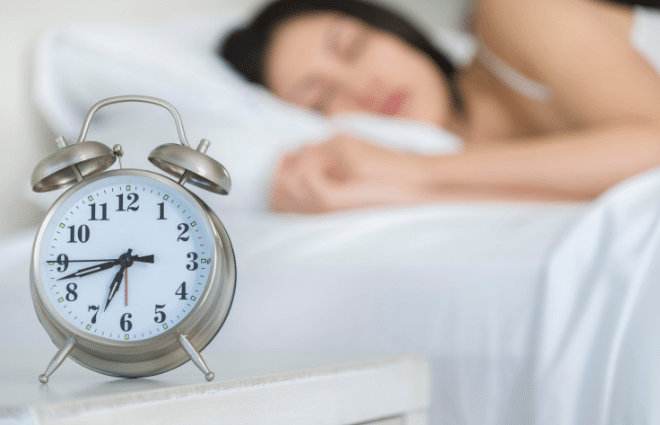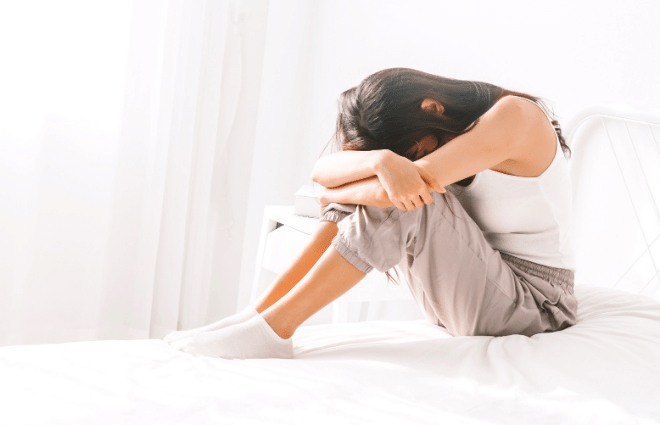Can Losing Sleep or Stressing Out Cause Insulin Resistance?
We all know we need a certain amount of sleep every night to function like a human being, as opposed to, say, a humanoid zombie creature.
Coffee might give you some energy if you’re short a couple hours, but that’s about as far as it goes.
If you’ve ever gone more than a few days without at least seven or eight hours of sleep (shoutout to my fellow parents—do you even remember what seven or eight hours of uninterrupted sleep feels like?) you know that there are a lot of other functions that start to break down besides energy levels.
Lack of sleep can cause you to feel mentally foggy, have slower reflexes, feel hungry—the list goes on.
Missing out on sleep is stressful and often dangerous–which only makes matters worse, since stress alone can also cause major health problems.
In fact, it turns out that lack of sleep or increased stress can actually lead directly to insulin resistance and weight gain–even if you’re eating right and exercising!
So does that mean that simply improving your sleep and reducing your stress levels can actually reverse your insulin resistance?
We’ll get to that in just a minute.
We did the research and found out everything you need to know about the way sleep and stress impact insulin resistance, and the best ways to fix these problems.
But first, let’s talk about how this vicious cycle starts.
This post may contain affiliate links, which helps keep this content free. Please read our disclosure for more info.
What Came First: The Chicken, or the Egg?
So does insulin resistance cause stress and poor sleep, or do stress and lack of sleep lead to insulin resistance?
The answer, unfortunately, isn’t precise—but the result is often a vicious cycle of lack of sleep that increases insulin resistance, which causes further sleep disruptions, which both lead to increased stress, which also impacts sleep and insulin resistance…you get the picture.
Many people with insulin resistance struggle with insomnia and poor sleep quality, including night sweats, unstable blood sugar, and frequent urination (especially if you’ve developed type II diabetes).
Insulin resistance and diabetes are also linked to depression and anxiety, both of which can cause added stress and poor sleep. (1)
On the flip side, studies have shown that even going just one night with four hours of sleep will immediately reduce insulin sensitivity and blood sugar regulation, as well as increase triglycerides and stress hormones. (2)
So while you might not know what part of this vicious cycle was the trigger for you, we do know that to reverse your insulin resistance, you have to break the cycle.
Let’s start with taking a look at how sleep relates to insulin resistance, and what you can do to break the cycle by getting enough shut-eye.
Sleep

Sleep is a tough subject for many of us.
The CDC says that more than 35% of Americans get less than seven hours (the recommended minimum amount) of sleep per night.
And even if you’re sleeping for seven hours or more, you might not be getting good quality sleep—which can be just as damaging as not getting enough sleep at all.
If you’re part of either or both of those groups, keep reading to find out how this impacts your insulin resistance, what happens when you increase or improve your sleep, and how to make that happen.
What Happens When You Don’t Sleep Well, or Don’t Sleep Enough
Skipping out on sleep can cause a whole host of issues.
We all know the basics, like feeling grumpy or irritable, having decreased reaction time, feeling clumsy or accident-prone, and having slower mental processing or inability to retain new information.
However, lack of sleep or poor-quality sleep also has a major impact on your health—including…
- slower healing,
- higher risk of infections,
- lowered immune system,
- and increased risk of both heart disease and type II diabetes. (3)
As we mentioned earlier, insufficient shut-eye can directly cause insulin resistance, as well as increase the stress hormone cortisol.
It can also reduce the hormone leptin, which is what helps you know when you’re full; and increase the hormone ghrelin, which makes you feel hungry.
And if you have sleep apnea, you’re at even higher risk of developing type II diabetes, regardless of whether you’re overweight or not. (4)
Translation? Lack of proper sleep can turn you into a grumpy bottomless pit of munchies literally overnight, and all the glucose from those extra snacks will be left hanging out in your bloodstream, wreaking havoc on your health.
And this is where the cycle might begin for you, since people with insulin resistance often experience sleep disruption from their unstable blood sugar levels, including:
- increased thirst,
- needing to pee more,
- having nightmares (seriously!),
- sweating a lot at night,
- experiencing headaches,
- and even being so tired that it’s hard to fall asleep. (4)
Pair all of those issues with increased appetite and lower impulse control, and it’s a recipe for disaster.
Tips to Improve Your Sleep

Fortunately, you can improve your insulin resistance simply by getting a good night’s sleep every night.
Here are our best tips for a better night’s sleep:
1. Practice Good Sleep Hygiene
No, we don’t mean taking a shower (although that can help).
Good sleep hygiene means:
- keeping your room dark and cool,
- having comfortable and clean bedding,
- playing white noise or a fan to block out nighttime sounds,
- and keeping all electronics out of your room (or off if they must be in there).
You can also consider adding a humidifier, especially if you frequently wake up with a stuffy nose; and/or an aromatherapy diffuser.
2. Have a Good Sleep Schedule
Our minds and bodies thrive on routines, especially when it comes to sleep.
Try to go to bed around the same time every night, and avoid staying up late (even if you’re able to sleep in the next day).
Not only will this help train your brain to expect and anticipate going to sleep at a certain time, it will also help you avoid late-night snacking.
Sleep schedules work even better if you have a nightly routine—such as reading a book, meditating, indulging in some self-care like a cup of hot tea or a moisturizing face mask, or even a calming yoga flow.
3. Turn Off Your Screens an Hour Before Bed
That means no TV, cell phones, tablets, etc. during the hour before you go to bed.
If you absolutely must check your device, make sure to wear blue-blocking glasses, or turn the device to night-time mode (which reduces the amount of blue light). (5)
4. Get Enough Exercise During the Day
Simply moving more during the day can help you sleep better at night—and it is also one of the best ways to improve your insulin sensitivity!
And you don’t even need to do crazy, high impact exercise to get this benefit.
Walking for just 30 minutes a day at a moderate pace is enough to keep your heart healthy, burn through some glucose, and help you improve your sleep.
Plus, you’ll likely lose some weight at the same time!
For better sleep, it’s best to get your exercise in during the morning or afternoon–especially if you’re doing cardio or high-intensity exercises.
If you do need to work out later in the day, stick to low-impact, meditative routines like yoga, or even just a gentle stretching session to work out any knots or tight muscles before bed.
5. Try a Natural Sleep Aid
If you’re really struggling with falling sleep and/or staying asleep, a natural sleep aid may be the answer.
Magnesium, melatonin, and valerian root are three of the most common options.
If you don’t want to pop a pill, you can try a warm bath with a cup of Epsom salt to get your evening dose of magnesium.
Add a few drops of lavender oil for a perfect evening self-care soak.
The warm water and aromatherapy will also help you relax, and should make it easier to catch some z’s.
6. Go to Your Doctor
If you’ve tried everything you can on your own, and you’re still struggling to sleep properly, it may be time to see your doctor.
You may need to use a prescription sleep aid for a while to break the cycle; or you could have a bigger issue like sleep apnea, depression, or anxiety that you need professional medical help to resolve.
Stress

Even if you’re getting enough sleep, you might be struggling with stress during your waking hours—and that can be just as damaging as lack of sleep when it comes to insulin resistance.
How Stress Impacts Insulin Sensitivity
You probably already know that stress can lead to weight gain, especially around the middle.
That’s thanks to the stress hormones, like cortisol and glucagon, which were our ancestors’ ways of surviving when food was scarce.
These hormones break down glycogen, which sends your stored glucose into your bloodstream for use (since your reptile brain thinks you’re in danger and wants you to have a boost of easy-access energy).
If your stress levels stay elevated, this leads to nutrient breakdown and insulin resistance. (3)
Basically, it tells your body to have all your energy ready to be used at a moment’s notice, and stop putting things away for later because you obviously need it now.
So instead of feeding your muscles, brain, and other vital bits, your body is keeping as much of your energy (glucose) as possible in your bloodstream, and filing the rest of it away as easy-access fat.
And like we mentioned earlier, stress also increases the hunger hormone ghrelin, and reduces the satiety hormone leptin—so your stress is driving you to add fuel to the insulin-sabotaging fire. (4)
Ultimately, stress leads you to eat more food more often, while simultaneously dumping glucose already stored in your body back into your bloodstream.
Tips to Improve Stress Levels
I’m sure you can see this one coming, but I’m going to say it anyway: Reducing stress can improve your insulin sensitivity.
So now the hard part: How do you actually reduce stress?
With our fast-paced, often erratic modern lives, stress can feel inescapable.
That’s why our goal is not to remove stress completely, but to reduce it, manage it, and ideally change the way we react to stressful situations.
Here are our best tips to start addressing stress in your life:
1. Practice Meditation and Mindfulness

Meditation has long been a go-to tool for reducing stress levels.
Practicing meditation helps you be aware of your body and your thoughts, and gives you an opportunity to pause during the day.
Breathing deeply and deliberately during your meditation can help you instantly release tension, and signals to your body that you are safe and can relax—which helps reduce those stress hormones.
Even if you don’t have the time or desire for a meditation session, simply being mindful of your thoughts, controlling your breathing, and releasing tension from your shoulders, stomach, and face can dramatically reduce stress.
2. Reduce Screen Time
As much as we all love our phones, TV’s, tablets, and all the other gadgets in our life, you know they add a level of stress to our world.
Social media is especially taxing, since it is built to make you have emotional reactions.
Being inundated with emotional information is very taxing on our minds, and it is easy to get tangled up in stress-scrolling, arguing in the comments, or simply hunched over the phone or computer while time slips past us.
Try setting reminders or limits on your social media time, as well as reducing the amount of time you spend in front of the TV or computer.
This will help you reduce stress, sleep better, and reduce the strain on your eyes from the blue light and small text.
3. Build Healthy Sleep Habits
We already went into detail on this one, but it’s worth mentioning how vital proper sleep is to reducing stress.
Aim for at least seven hours each night, and practice good sleep hygiene to help you sleep soundly through the night.
4. Get Enough Exercise (Especially Yoga)
A lot of mental stress ends up “stuck” in our body—from sore, knotted muscles, to strained necks and facial muscles, from tension headaches to carpal tunnel, stress finds some uncomfortable ways to take up residence in our bodies.
Exercise is a great way to work out those tight muscles, and get some feel-good hormones pumping through your system—especially if you stretch or practice yoga.
The abdominal stretches in yoga have actually been shown to stimulate the pancreas, helping it to regenerate cells—which helps repair damage caused by over-production of insulin.
Yoga also has been shown to directly reduce insulin resistance by increasing insulin receptors, reducing insulin binders, and improving glucose levels in the blood. (6)
Whatever exercise you choose, you’ll be burning glucose, increasing insulin sensitivity, and counteracting stress hormones with endorphins, dopamine, and serotonin.
5. Eat Healthy
Diet is perhaps the most important factor in reversing insulin resistance for a number of reasons—and stress levels are absolutely affected by what you eat.
Eating a poor diet directly contributes to stress by causing inflammation, weight gain, blood sugar spikes, poor digestion, mood swings, vitamin deficiencies, and more.
Make sure to eat a diet rich in lean proteins, cruciferous vegetables, and healthy fats.
You can also include fruits and whole grains that are low on the glycemic index, such as berries and oats.
Avoid sugar and processed carbs as much as possible, and stay away from so-called “healthy” boxed foods, pre-made meals, and the like; and consider taking a daily multi-vitamin to fill in any nutritional gaps.
6. Get Help from a Professional
If you can’t seem to get your stress levels under control, you may need to seek help from your doctor or a therapist.
Your mental health is vitally important not only for your peace and happiness, but also for your physical health and immune system—both of which begin to break down the longer you allow your stress to go untreated.
How to Break the Cycle, and Finally Feel Healthy and Lose Weight
So now that you know the impact of sleep and stress on your health and weight, it’s time to make a plan to break the most dangerous part of the cycle: insulin resistance.
Improving your insulin sensitivity is no easy feat, and many people struggle with their weight and health for years because their bodies simply aren’t absorbing glucose readily.
The truth is, you have the power to reverse insulin resistance—but it’s going to take some serious dietary changes to make it happen.
And if you’re hesitant to start a weight loss program because you feel like you’ve tried just about everything, and nothing has worked (or worked for long), then this is absolutely for you.
Many of our clients felt exactly the same way before starting our program—hopeless, exhausted, frustrated, and just over weight loss programs that don’t work for them.
We created our 21-Day Fat Loss Challenge for people exactly like you—people who feel like they’ve tried everything under the sun, but just can’t shed the weight or keep it off.

Our challenge provides a step-by-step plan to help you lose up to 21 lbs in just 21 days, with far less effort than you may think!
Tons of our clients have turned it into a lifestyle diet and have lost as much as over 100 pounds with the challenge!
The best part? Besides just losing weight, the 21-Day Fat Loss Challenge was designed to heal your gut, rebalance your hormones, and retrain your tastebuds—so you’ll actually be able to keep the weight off!
The Challenge is perfect for people with insulin resistance, as many of our clients have actually reversed their insulin resistance with the Challenge.
If you’re ready to make some changes in your life, this is the ONLY place you should start. We’ll teach you exactly how to make the necessary changes in your diet and lifestyle, and how to keep them “beyond the diet.”
Take control of your life and start your 21 Day Fat Loss Challenge TODAY!
Leave a comment below if you enjoyed this article on the impact of stress and sleep on insulin resistance, or if you have any questions!


Sleep is essential part of life and without proper sleep nobody can live a healthy life. The article contain lot’s of important information which I was looking for. I also want to add one more thing, there are some other factors also that can affect our sleep routine such as nausea and depression. So visiting a doctor may help you in finding a peaceful life.